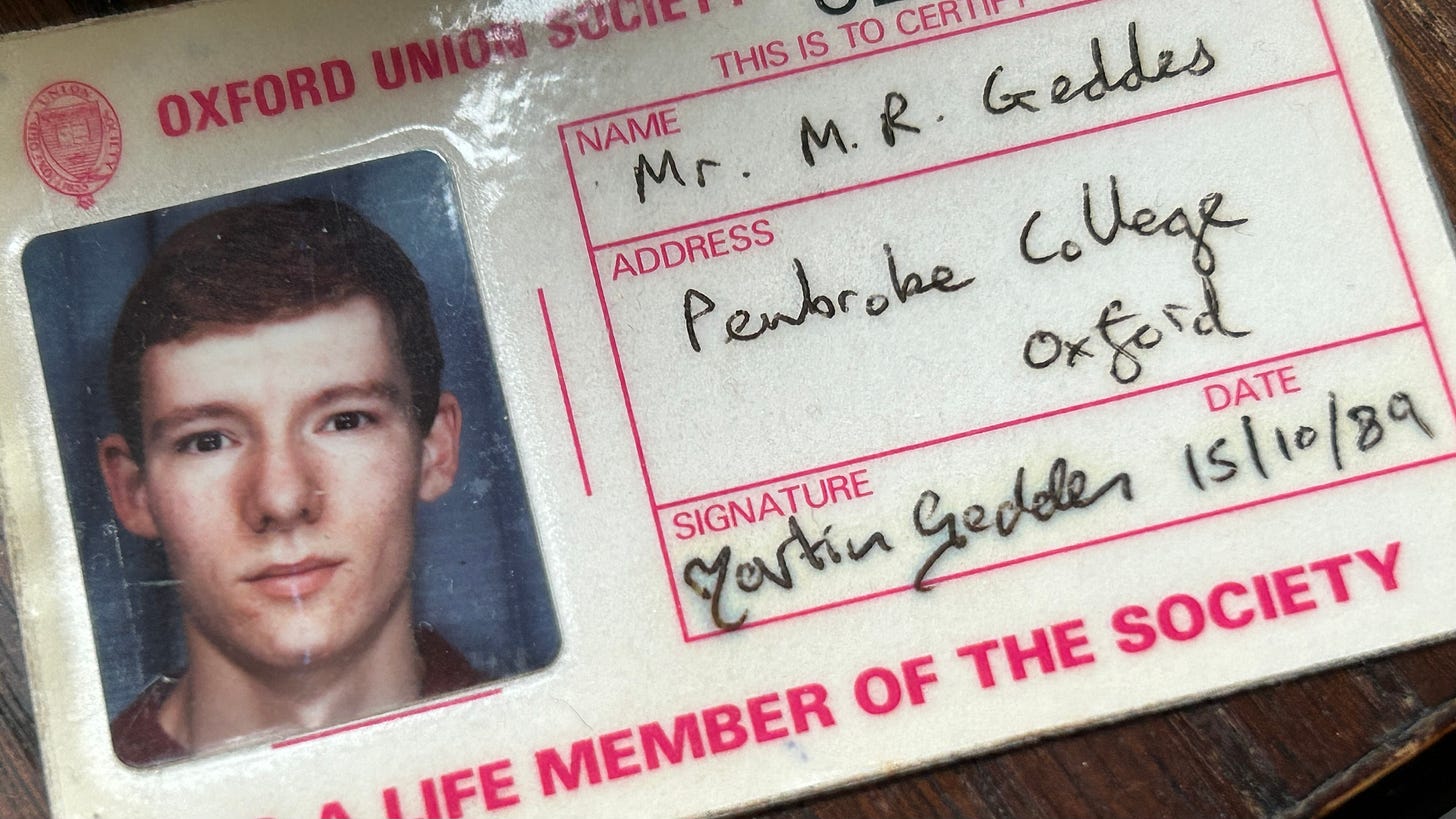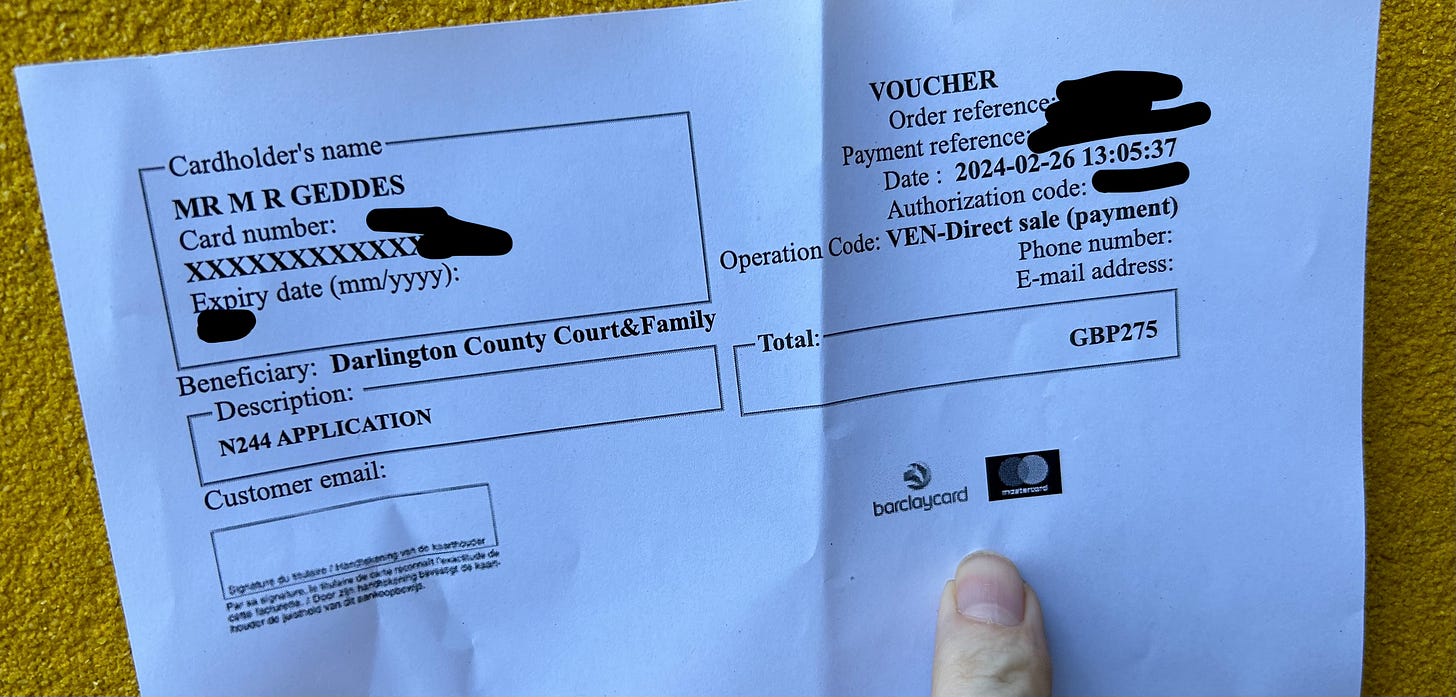Today I took my 22 year old car and drove (in my hoodie!) from my rented Band A council tax home (the cheapest property band in England) the seven miles or so to Darlington, the nearby town where the local court is. I paid £275 to put in some paperwork, had some cake and coffee in a cafe, and came back for a nap. This may not sound like a monumental effort or substantive achievement, but let me tell you, for me it was like having climbed a mountain in winter conditions.
The reason? I am facing down delinquent judicial authority that is being used to suppress justice for ordinary people, and I am exhausted from the constant anxiety of dealing with iniquity for years on end. Given all the injustice and trauma I have been through in the past five years or so, it takes all I have left to push myself to complete this kind of administrative task. Every interaction with the corrupt state is like having a “life force leak”. And £275 (not £108 as I anticipated in the video) is a lot of money to me — I winced at it, as my overdraft will pay my rent this month.
I have come to perceive the moral violence in society as some of the worst cruelty that causes the greatest injury, albeit unseen and unacknowledged as it refuses to bleed. Great harm comes when people with no access to lawyers and poor literacy are confronted with a legal system that is not configured to engage with them, and does not give them respect or fairness, especially when opposing powerful corporate interests. The detachment of the bureaucratic bourgeoisie from the effects of their actions on the weak and weary is catastrophic to human lives.
In my last car video, I was delivering some paperwork to Durham County Council to stop them bullying me and robbing the public. (They have responded that they have “nothing more to add” to their previous correspondence, but that is essentially submission in the estoppel process, so I have “won” — for now.) Sitting in the car that day, I reflected upon the determination in early life it took for me as a bright “working class lad”, who won a scholarship to a private school, to get in to to Oxford to read, err, not very much because the pre-Web Internet was way more interesting.
As part of my Oxford experience, I joined the world-famous debating society, the Oxford Union. I can remember seeing the now-famous politician Jacob Rees-Mogg doing his performative thing as a teenager, as his distinctive posh style stood out even in that milieu. I bet you that Jacob pays his council tax without any question as to whether it is being enforced via unconstitutional administrative courts. He won’t be caught up in the “clean air zone” or “low emission zone” dragnet with an older car, and brought before a rigged tribunal. And given his name recognition from TV and the press, I doubt any senior judge would treat him badly.
I sometimes reflect on how my path has taken me on a completely different journey to people I have encountered from that era in my life. Martin and Jacob are both rabid fans of constitutional law, but my interest is far more pragmatic and less intellectual. I don’t have a hedge fund fortune, Jacobean mansion, or even pension savings for that matter. I do get invites to fancy university alumni events at places like the House of Commons, but I generally cannot afford to go to them. It is like having a spy hole into the upper echelons of British society, but that’s not who I am or where I belong. My calling is to bring my skills to bear on everyday problems for unprivileged people.
Some of you will recall the classic mid-90s pop song “Common People” by Pulp. It tells the tale of students at art college, where a child of a wealthy family wants to “slum it” like the “common people”, but will never truly know the experience of being poor and oppressed, with no easy means of escape from one’s circumstances. What I am going through is a strange hybrid world, neither that of the “common people”, as I have access and credentials they do not, nor of the legacy technocratic elite, for which I paid the top entry fee, but am banished due to my apostasy of their creed of conformity.
The court filing today included a statement as to why the judge in my case — against TV Licensing and criminal fraud by BBC/Capita — should be recused, along with a witness statement by me of poor behaviour of the same judge that I observed in another case. I don’t want to spill the details out in public, as it could be seen to sabotage my effort to get a fair hearing in front of an impartial adjudicator who is dedicated to blind justice. Let’s just say I have applied my full skill to the matter, and even at my old technology consulting rates, this would not have been a cheap piece of paperwork to buy from me.
Meanwhile, a more authentically “common person” friend, who was wronged by the same judge, sits in a house that has been powered by a diesel generator for a year. He was unlawfully cut off from the power grid in as punishment by the utilities mafia for challenging the abuse of authority. This judge applied his judicial mind to evading the central matter of one party having no standing, which was misconduct in public office, and is a crime. He refused to debate equity matters at all. Instead, he chose to defend the Establishment position, and rewrote the law from the bench. A signed witness statement from this friend was in my bundle, as testimony to the abuse of public office.
As I wasn’t feeling great last week, I indulged in something that is rare for me, which is to watch some YouTube videos. This included spectacular aircraft rejected takeoffs and other aviation videos — my father was an aircraft mechanic. It reminded me of my many years of nonstop global travel, for both business and personal reasons. I have been on a plane once in four years, for an emergency family trip lasting just a day, and couldn’t be coaxed onto one even if you paid me. The Covid tyranny has left an indelible mark on my life, and very ordinary situations leave my nerves rattling. This has been a stormy period in life, yet I am still standing, albeit shaken.
As part of my aimless time-wasting online, I looked up alumni from my Oxford college, and discovered that a William Blackstone wrote the definitive text on common law in the 18th century. I could have had his former room in Old Quad in the second year, as I came near the top of the room ballot, but instead had a quieter spot in the almshouse near the Master’s lodgings. What I am discovering the hard way is how jurisprudence has become “all mind and no heart”, disconnected from spiritual considerations. The very essence of justice rooted in natural law is ignored; equity is relegated to an abstract idea or unattainable ideal, not a lived experience or ethical exigency.
Today’s trip to court to ask to have a judge removed from my case was the equivalent of pulling the handle on a train to slam on the emergency brakes. It is not something most people will do in their lifetime, and it isn’t a frivolous matter, as it can cause metaphorical injury. My application could have serious repercussions for that person’s career and life, as well as my own welfare from the stress of another contentious hearing. I am mindful not to use my own intellect to engage in self-aggrandising acts of legal vandalism, the counterpart of the aggressive behaviour I have seen from the judicial bench. It is one of the weightiest things I have ever had to do.
On the way out this morning I caught wind that Lord Rothschild has officially passed; I also read that Jacob worked for his banking empire, something I am untainted by. On the way back home, I was called by an acquaintance, who is fighting for justice after having her car stolen by authorities, using corrupt administrative courts. The lament I heard from her was how few “uncommon people” there are who have the motivation, skills, and resources to push back. When the state turns from agent to aggressor, and uses its foot soldiers to suppress the people it is meant to represent and protect, it is too easy to “go along to get along” — at a cost transferred to others.
I keep my car constantly topped up with diesel after each longer journey, as you never know what will happen in the world, and what emergencies might be thrust upon us. Life at the moment is a bit “on the edge, at the edge”. I struggle a bit with daily affairs after an (attempted or actual) genocide, and have my natural worries as to what we may yet face in this “final showdown” of 2024. That said, I do sleep well in general. There is no residual concern that I should have put more effort into researching the subversion of our society, or tried harder to warn other people of the dangers we faced, or risked more to resist tyranny. There is no swapping of a hedge fund for a clear conscience.
I see my endeavours as representing a rare chance to be that “uncommon person” who can (just about) withstand the emotional and practical cost of rejecting the moral violence of the state and its agents. If the legal system is too expensive, imposing, or alienating for me acting alone, as a “commoner-elitist hybrid”, then it is not fit for purpose. The whole point of my Oxford-educated background is not to be impressed or intimidated by men in fancy suits or robes; they are no superior to my own teenage friends and acquaintances. It is that extraordinary institutional past, that combines with the ordinariness of my own present situation, that makes the uncommon need into an essential calling.












